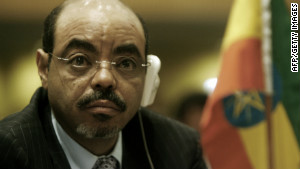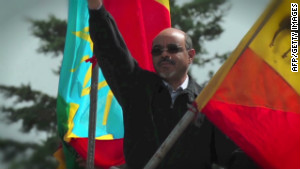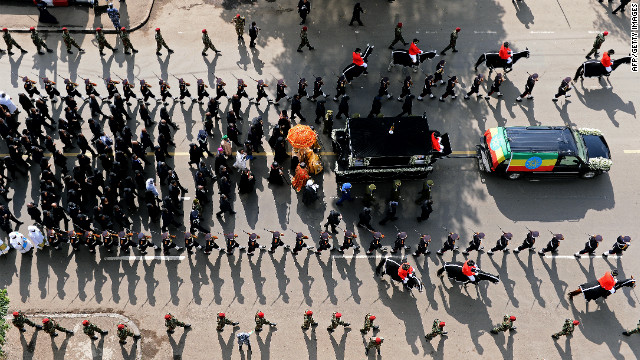September 2, 2012 -- Updated 1054 GMT (1854 HKT)
STORY HIGHLIGHTS
- African heads of state and foreign envoys attend the ceremony
- He is the first leader honored with a state funeral in the nation since 1930
- Ethiopians flood the streets, some in tears, as they clutch posters with his picture
Meles, 57, died two weeks
ago of an unspecified illness. He had not appeared in public for
months, sparking nationwide speculation about his health.
The prime minister, a key
U.S. ally, is the first leader honored with a state funeral in the
nation since Empress Zauditu in 1930.
A contingent of African
heads of state and foreign envoys attended the ceremony at the main
square in the capital of Addis Ababa.
Presidents of Uganda,
Rwanda, South Sudan and Nigeria were among leaders who hailed him for
bringing development to the nation during his 21-year rule.

Ethiopian PM dies at 57

Ethiopia's mysterious PM dies abroad
Mourners followed the
coffin as it made its way through the capital in a horse-drawn carriage
accompanied by a marching band. Others flooded the streets, some in
tears, clutching miniature flags and posters adorned with his picture.
His relatives, who were dressed in black, sat on stage with the heads of state.
In days leading up to the
funeral, his flag-draped coffin lay at the national palace for a public
viewing. He will be laid to rest at the Holy Trinity Church behind the
palace, where famed Ethiopian emperor Haile Selassie is buried.
Meles was credited with
working toward peace and security in the region, and was instrumental in
peace talks between Sudan and South Sudan. He dispatched Ethiopian
troops to battle militants in Somalia, and is a major player in the
African Union, which is headquartered in Addis Ababa.
Ethiopia is often lauded
for effective use of aid money, and his nation has remained relatively
peaceful in the unstable horn of Africa region.
He was a leader who focused on the big picture, said Susan Rice, the U.S. ambassador to the U.N., who attended the funeral.
Meles came to the
forefront as a leader of a guerrilla insurgency against dictator Haile
Mengistu Mariam in 1991, and cemented power in the ensuing decades.
However, human rights
groups accused his government of a heavy hand and a series of abuses,
including limiting press freedoms and cracking down on the opposition.
"He came to power at the
barrel of a gun, but he made the transition from rebel leader to
political leader very quickly," said Ayo Johnson, director of Viewpoint
Africa.
Though he was vilified
for his human rights record, the West turned a blind eye to his
shortcomings because he battled Islamist movements in the region, a
major concern for the U.S., according to Johnson.
Meles' relatively unknown successor, Hailemariam Desalegn, served as his deputy.
The next ballot is scheduled for 2015, g


No comments:
Post a Comment